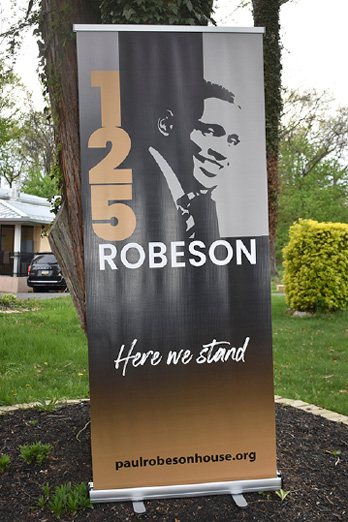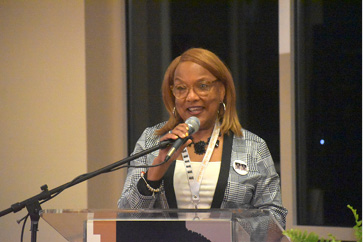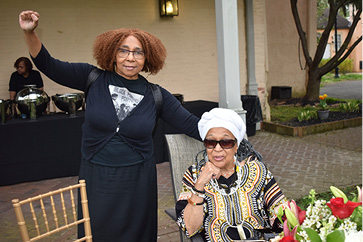PHILADELPHIA—Paul Robeson is one of the most remarkable Black voices of the 20th century. An actor, singer, athlete, and activist, Robeson’s powerful voice resonated worldwide. Born on April 9, 1898, in Princeton, New Jersey, he entered the world at a time of profound racial and political divides. Despite this, he grew up to become one of the leading voices in the fight for civil rights, labor rights, and freedom throughout his life.
The Paul Robeson House and Museum in Philadelphia marked the esteemed activist’s birth with a week-long event, April 8-15, titled “Here We Stand.” This celebration included bus trips to his birthplace of Princeton, N.J., and an Easter service at Mother AME Zion Church (his home church) in Harlem. In Philadelphia on April 13, he was honored with a street naming ceremony, a block party, and the unveiling of a stained-glass door bearing his image.
An outstanding panel discussion centered around “The Threads of Black Radicalism” was moderated by Attorney Michael Coard and featured Fredrika Newton, wife of Huey P. Newton, co-founder of the Black Panther Party; activist Mike Africa Jr., and writer Solomon Jones.

Sweet Honey In The Rock concluded the memorable occasion on April 15 with an extraordinary musical concert featuring guest speaker Gina Belafonte. Serving as chair and co-chair were Harry Belafonte and Danny Glover.
Janice Sykes-Ross is the executive director of Paul Robeson House and Museum in Philadelphia.
She spoke to The Final Call during the panel discussion held at the historic Belmont Mansion on April 14. “This year’s 125th-anniversary celebration is about reconnecting with our roots and propelling ourselves forward. Drawing inspiration from his book ‘Here I Stand,’ the theme for this year-long event has been revised in its motto to ‘Here We Stand’—symbolizing unity in carrying forth history into future generations,” she explained.
“He was a true renaissance man, and his commitment to civil rights extended far beyond the boundaries of the United States. His unwavering passion for advocating justice saw him become an international champion for labor movements, decolonization efforts, and speaking out against apartheid in South Africa—all at great cost as he sacrificed what could have been one of the most successful entertainment careers ever recorded on both a national and global scale. He was the quintessential man of civil rights,” Ms. Sykes-Ross said.
Dr. Regina Jennings shared her unique perspective, drawing on her expertise in African American literature and Black resistance. She cited Paul Robeson as a stark example of how oppression can come when one speaks out against injustice. “He saw his passport taken away and his film career ended due to speaking up about lynching; all while justice failed those whose lives were already lost by such an abhorrent practice.”
After considering Mr. Robeson’s struggles, Dr. Jennings posed an insightful question: “Without economic stability, how can a man hope to provide for his loved ones? Without this essential foundation, their wellbeing is put in jeopardy, and its effects are far-reaching—potentially leading even to mental distress.”
David Merrill, a tour guide at the museum dedicated to Mr. Robeson’s legacy, spoke fondly of the revered figure. “Paul Robeson was truly an inspirational individual. His immense physical and mental capabilities alone make him remarkable. Yet, he gave so much more sacrificing his career to stand up for those rejected and despised. He embodied unparalleled talent coupled with unwavering commitment, which made him an incomparable hero,” said Mr. Merrill.
“Paul Robeson was a man of conviction and principle, which is often lacking in today’s society. During his appearance before Congress’ Committee on Un-American Activities, they offered him to keep his passport if he would only stop speaking out, but instead, he refused this offer and kept true to himself,” he added.

“His courage and commitment were unshakable, even when he faced the tremendous sacrifice of a $94,000 reduction in salary. This extraordinary man never wavered; despite his challenging circumstances, he kept going with power and conviction. He deeply inspires me—an enduring hero who has earned my admiration since the beginning.”
Mr. Merrill recounted Mr. Robeson’s influence on the Spanish Civil War which took place 1936-1939. During this time, Paul Robeson used his melodic voice to stop a war in its tracks literally! Both sides—the Republicans and Nationalists—came together under an agreed-upon truce to allow him to perform “Old Man River” over speakers on the front line of battle.
Mr. Robeson’s biography describes his academic excellence, and athletic and musical ability during his early years. He won a scholarship to Rutgers University, where he excelled in academics and sports, becoming an all-American football player. After graduating, he enrolled in law school, where he faced open discrimination as a Black man. But instead of caving into this injustice, his spirit was emboldened, and he became increasingly vocal in his demand for equality.
Mr. Robeson’s political activism was driven by his concern for the poor and working-class people, specifically Black folk. Throughout the 1930s, he traveled the world, singing and speaking out against fascism and racism. His message of hope and peace resonated across the globe, particularly among the oppressed. But despite his efforts, he was subject to relentless harassment, smear campaigns, and character assassination. For years he was blacklisted, and his work was purged from history.

One of Paul Robeson’s lasting contributions to the world is his role in the Civil Rights Movement. He is best known for his activism and outspokenness, calling for an end to segregation and racial injustice. His song “Old Man River” from the musical “Show Boat” became an anthem of the struggle against inequality. His work about the Black experience and the fight for Black rights stands as a beacon of hope and a testimony to his unwavering commitment.
Ms. Sykes-Ross rightly affirmed that Paul Robeson’s legacy is enduring, reverberating globally with people from all walks of life inspired by his unparalleled commitment to justice and human rights. “As we commemorate the 125th anniversary of his birth, let us honor this extraordinary individual for reminding us that striving for true equality never ceases. It is a cause upheld from generation to generation. Please visit us at the museum located at 4951 Walnut St., Philadelphia, Pa.,” she said.
Janice Sykes-Ross, executive director of Paul Robeson House and Museum in Philadelphia.













